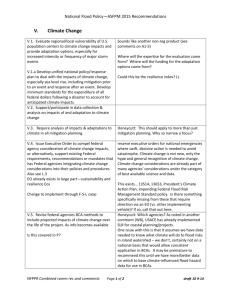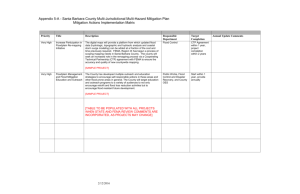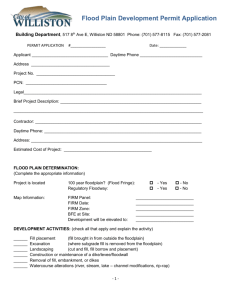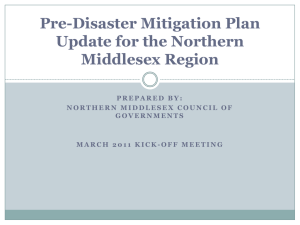Hillsborough County Local Mitigation Strategy and the Community Rating System
advertisement
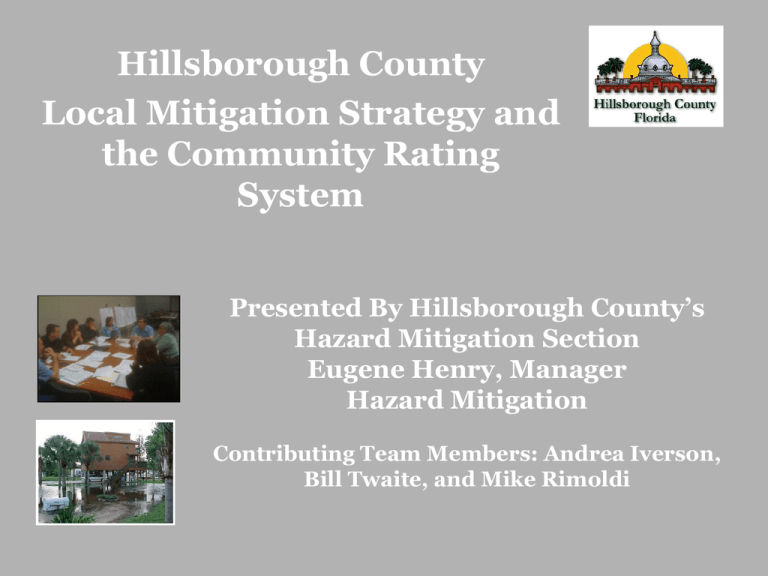
Hillsborough County Local Mitigation Strategy and the Community Rating System Presented By Hillsborough County’s Hazard Mitigation Section Eugene Henry, Manager Hazard Mitigation Contributing Team Members: Andrea Iverson, Bill Twaite, and Mike Rimoldi Welcome – Our Community During Blue-Sky Times! 2 Today’s Scope • Glimpse into Local Mitigation and the National Flood Insurance Program Community Rating System • Regional CRS Committee • Benefits Definitions on the Subject Definitions: APA, PAS Report 483/484, 1998 (except mitigation). • Mitigation: Any action taken to prevent or reduce damages (loss of life and property) associated with natural or manmade disasters. • Post-Disaster Reconstruction Planning: The process of planning prior to an actual disaster, those steps the community will take to implement long-term reconstruction with one of the primary goals being to reduce or minimize its vulnerability to future disasters. These measures can include a wide variety of land-use planning tools, such as acquisition, design review, zoning, and subdivision review procedures. . . • Recovery: The process of restoring normal public or utility services following a disaster, perhaps starting during, but extending beyond the emergency period to that point when the vast majority of such services, including electricity, water, communications, and public transportation, have resumed normal operations. . . • Redevelopment: This concept is similar in the post-disaster concept to reconstruction but deals with rebuilding the community’s economic activity. . . • Note: To maintain consistency with terms used in Florida Administrative Code, Post-Disaster Redevelopment is used in place of Post-Disaster Reconstruction Planning. Bad Things Do Happen Mitigation and Hazards Planning Hillsborough County Aerial Description of Preand Post-Growth Management and Floodplain Management Regulations New mixed development helps preserve coastal wetlands and puts development further from risk areas. Old-style coastal floodplain development Mitigation and CRS Activities Local Mitigation Mitigation and Regulatory Review Integrated Processes and Multiple Agencies Land Use LDC and Building Codes Habitat Conservation Plan, Floodplain Management Plan . . . Mitigation Activities Elevation Projects Preservation and Conservation Areas Sirens CRS 300 Series (Public Information Activities) 400 Series (Mapping and Regulations) 500 Series (Flood Damage Reduction Activities) 600 Series (Flood Preparedness Activities) Floodplain Management Plan Repetitive Flood Loss Planning In Advance Collaborative Actions – WHY MITIGATION? Hazard Probability Consequence Frequency Severe Storms High Major 2 to 3 Years Hurricane, Minor High Moderate 2 years Hurricane, Major Moderate Major 50 years Wildfire High Minor Multiple Annually Flooding Moderate Minor to Moderate 5 to 10 Years Sink Holes Moderate Minor Multiple Annually Drought Low Minor to Moderate 5 to 10 Years VULNERABILITY • Most repetitive disaster in the County • 70,000 at risk within the Special Flood and Coastal High Hazard Areas • Greater than $10 billion in coverage • Greater than $6 million in annual savings to residents within unincorporated County Greater than 1 million People Risk Analyses and Vulnerability Repetitive Flood Areas Assessments Man-made Hazard Areas Tropical Storm & Tornado Areas Pre- & Post-Disaster Redev. Planning – includes Reviewing Economic Impacts Economic Output ($ Billions) - Conservative Recovery 10 8 6 4 2 0 -2 -4 -6 -8 -10 Year 1 Year 2 Year 3 Total GRP Year 4 Year 5 Personal Income Year 6 Year 7 Output Business Recovery Impacts Economic Output ($ Billions) - Aggressive Recovery 10 8 6 4 2 0 -2 -4 -6 -8 -10 Year 1 Year 2 Year 3 Total GRP Year 4 Personal Income Year 5 Output Year 6 Year 7 Mitigation and Community Rating System 10-step Planning Process Community Rating System • When your community participates in the CRS, everyone benefits, including those who don't live or own property in a floodplain. Even when there is no flooding, your community's public information and floodplain management efforts can improve the quality of life, protect the environment, make people safer, and save everyone money. • If there is a flood, your CRS activities: – Save lives. – Prevent property damage. – Avoid lost jobs and economic devastation caused by flooding of offices, factories, farms, stores, and other businesses. – Prevent damage and disruption to roads, schools, public buildings, and other facilities. Community Rating System and Floodplain Management Credit Points 4,500+ 4,000–4,499 3,500–3,999 3,000–3,499 2,500–2,999 2,000–2,499 1,500–1,999 1,000–1,499 500–999 0–499 CRS Class 1 2 3 4 5 6 7 8 9 10 Premium Discount 45% 40% 35% 30% 25% 20% 15% 10% 5% 0 Flood Threat We Do Have Tsunami Threats Wildfire Threat Sinkhole Threat Mitigated for Flood Post-Disaster Redevelopment Plan Conceptual Priority Redevelopment Areas 21 Questions and Answers and Closing Have a safe storm season! Materials are available for your convenience at: http:/www.hillsboroughcounty.org 22
